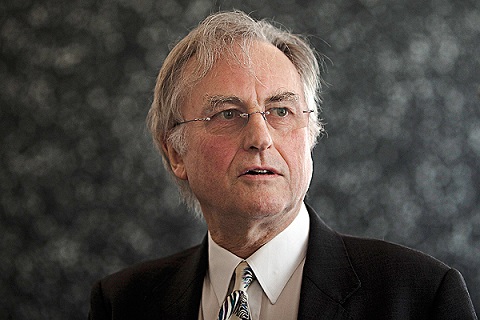
Oxford ethologist and evolutionary biologist, author of a dozen or so books, and foremost spokesman for modern atheism.

Richard Dawkins's professional credentials are highly impressive: a Fellow of both the Royal Society and the Royal Society of Literature, Charles Simonyi Professor for Public Understanding of Science at Oxford University (from which he resigned in 2008), Fellow of New College, and recipient of at least the following, the 1987 Royal Society of Literature Award, the 1990 Michael Faraday Award of the Royal Society, the 1997 International Cosmos Prize for Achievement in Human Science, the Kistler Prize in 2001, the Shakespeare Prize in 2005, the Lewis Thomas Prize and the Galaxy British Book Awards Author the Year Award in 2007.
It is near impossible to beat such accomplishments. His catapult to public fame began with his rightly highly regarded The Selfish Gene. But Dawkins is also one of the foolishest persons alive when it comes to religion (and especially Christianity, though he has also asserted that Islam is the greatest force for evil in the world today). He is adamant that evolution is purposeless yet he spends his entire life writing with impassioned purpose to persuade everyone who would listen that it is purposeless. Worse, he does this not by means of reasoned arguments (because when he does he shows himself totally incapable of true and honest reasons—as so plainly evidenced in The Delusion of God) but by resorting to contempt, ridicule, and plain silliness. His suggestion for dealing with religious persons who disagree with him is to "go beyond humorous ridicule, sharpen our barbs to a point where they really hurt." "Fence sitters . . . 'are likely to be swayed by a display of naked contempt. Nobody likes to be laughed at. Nobody wants to be the butt of contempt.'" Of those who disagree with him on evolution he says, "it is absolutely safe to say that if you meet someone who claims not to believe in evolution, that person is ignorant, stupid or insane (or wicked, but I'd rather not consider that)."
There is always the danger in simplification that we over-simplify. Cognizant of this, we may say that Dawkin's arguments with regards to evolution consists of this:
1) To the classical question in the evolution debate, "is there a series of Xs connecting the modern eye (the eye is the shorthand in evolution-speak for a complex organism) to an earlier state of no-eye?" he says, "It seems to me clear that the answer is yes, provided only that we allow ourselves a sufficiently large series of Xs" (The Blindwatchmater, 78; emphasis his). As he marches along, however, the "seems to me" metamorphizes into an established fact. What was quietly suggested as "plausible" transforms by the end of the book (and all his writings) into proven mechanisms.
2) As to the driving force of this progress from no-eye to modern-eye, his conclusion is that it was (as the title of the book already suggests) blind; "the evidence of evolution reveals a universe without design." The only thing that evidences can do is precisely nothing; evidences are meaningful only when interpreted. They don't reveal anything until the investigator interpretes them as significant and contributive of a larger picture. Dawkins cheats by personifying evidence so that she "reveals," when, of course, it was Dawkin doing so. That evolution is unguided is Dawkin's own religious (though atheistic) idea foisted on the theory of evolution. That other evolutionists—both theistic and otherwise—can and have read the evidence differently shows that the evidence is ambivalent at best. That evolution is without design is not a fact of evolution but simpy Dawkin's own perceptual (more likely philosophical) construct jacked onto his exposition.
But perhaps the most damning weakness of Dawkin's writings is that he cannot, and does not, live it. So, if evolution is purposeless and we are all just the products of materialistic evolution, why is Islam "the greatest force for evil in the world today"? By his own teaching, Islam should be no more than another purposeless force of nature acting selective pressures to the ongoing process of evolution of which human culture is a part? What is "evil" in a purposeless evolutionary process? Why is it evil? Dawkins, it is clear, wants to keep the cake and eat it as well: evolution may be purposeless but life must be meaningful. In the end, Dawkins is a showman and a magicain spinning mental tricks and intellectual sleight of hand with impressive words (you don't get to be a member of the Royal Society of Literature for nothing), hoping no one catches him out. Just before he interviewed Graig Venter (who had helped map the human genome) Dawkins gave a monologue1 in which he says science does not take sides, that it looks only for objective truths. Science may not; he very clearly does.

Further Reading & Resources:
If you wish to know something of where evolution is in the intellectual climate of our day you have to read at least one of Dawkin's books; I suggest The Blind Watchmaker. He has written many more book since, but they basically add no new insights into the subject. Two of the best refutations of Darkin's philosophy is found in Alvin Plantinga, Where the Conflict Really Lies. Science, Religion, & Naturalism (Oxford: Oxford University Press, 2011), and Alistair MacGrath & Joanna McGrath, The Dawkins Delusion? Atheist Fundamentalism and the Denial of the Divine (Leicester: IVP, 2010).
1 Dawkin's monologue may be viewed on Youtube

Resources:
Stephen Clark, "Richard Dawkins: The God Delusion or the Dawkins Delusion?" Foundations 57 (May 2007): 37-42. PDF N
Alister McGrath, "Review Article: The God Delusion," Anvil 24.1 (2007): 46-51. PDF N
Alister McGrath, "Has Science killed God?" Faraday Paper No 9 (Apr 2007). 4pp. PDF N

©ALBERITH
190927lch